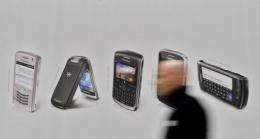A man walks past an advertisement for mobile devices in Hanover, Germany. Regulators will bid Monday to extend mobile Internet access to Europe's farthest flung outposts by opening up commercial rights to the analogue broadcasting spectrum.
Regulators will bid Monday to extend mobile Internet access to Europe's farthest flung outposts by opening up commercial rights to the analogue broadcasting spectrum.
Britain, France and Germany are each moving towards total digital switchover which others must eventually match, but the drive has repeatedly raised fears of remote and elderly populations being left behind in the communications revolution.
In an effort to allay those fears, the European Union wants all member states to agree from 2013 to free up existing analogue frequencies used for television and radio output so that telecoms companies can fully extend wireless access, according to documents seen by AFP this weekend.
Intriguingly, Monday's proposals will show, Brussels also suggests using these post-recessionary times of high unemployment to encourage the roll-out of new public works programmes underpinning private investment, to dig extra fixed-line networks.
"Public authorities may decide to undertake, at their expense, civil works in order to enable and accelerate the deployment by the operators concerned of their own network elements," the commission suggests.
From the wilds of the west coast Highlands and islands of Scotland to the remote edges of Bulgaria, there are gaps in sharp-end mobile coverage that policymakers see as a major driver of economic growth over coming decades.
Setting up fixed broadband cable networks is either technically challenging or commercially prohibitive, but getting the measures through member states and the European parliament also means overcoming stiff lobbying.
On average, 94 percent of Europeans had high-speed broadband access by the end of 2009, but that proportion falls to 80 percent in rural areas and national disparities mean the figure can fall ever lower.
The European Commission estimates total private and public investment in new fibre-optic cable networks by 2020 at between 180 and 270 billion euros, if networks are "to provide sufficient coverage so that 50 percent of households are on 100 megabits per second services."
Under Europe's 2020 strategy for attaining a "smart, sustainable and inclusive economy," all Europeans should by that date have "access to Internet of above 30 Megabits per second."
Radio and television frequencies -- often under public monopolies -- should be made available to these ends by January 1, 2013, the proposals state.
The telecoms industry, as represented by the European Telecommunications Network Operators' Association, unsurprisingly spies a "unique opportunity."
Said its director, Michael Bartholomew: "Opening up additional spectrum for mobile broadband services is essential to bridge the digital divide and to meet rapidly increasing consumer demand."
But the current users of these frequencies inevitably see their own business opportunities, as articulated by the European Broadcasting Union.
"Wireless broadband is neither a viable replacement for terrestrial broadcasting nor an alternative to fixed broadband," it said in a submission, underlining: "It is not a solution for rural broadband."
(c) 2010 AFP




















